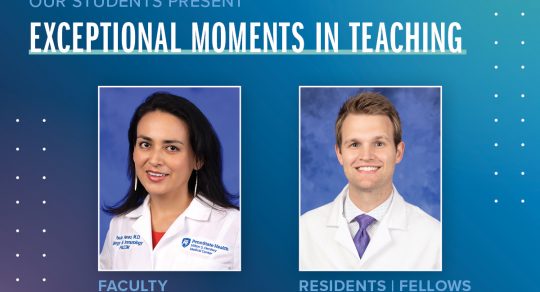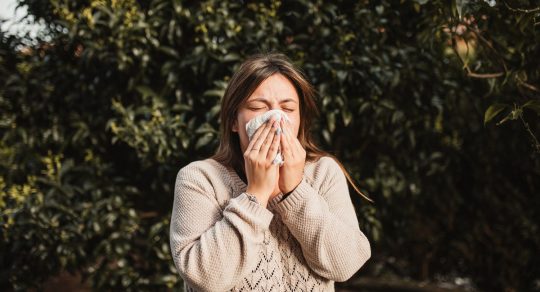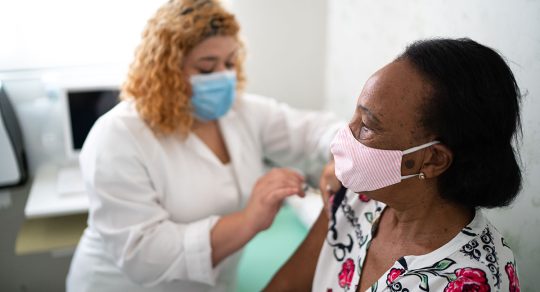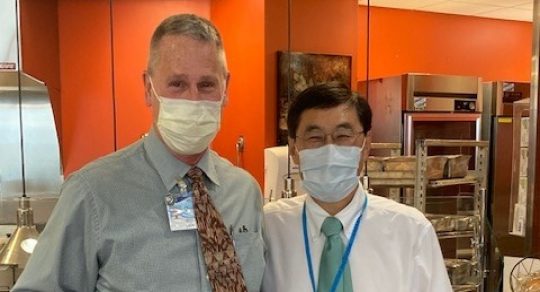Fellowship
Allergy and Immunology
The Allergy and Immunology Fellowship at Penn State Health Milton S. Hershey Medical Center is a two-year, ACGME-accredited program that admits two fellows per year.
Explore More
The Allergy and Immunology Fellowship has an overall goal of providing the best environment for nurturing, educating and training future allergy-immunologists – a respectful environment that celebrates diversity, provides equal opportunity for growth and has no tolerance for discrimination with regard to race, gender, gender identity or ethnic and cultural background.

Program Overview
The program accepts applicants trained in medicine, pediatrics or medicine/pediatrics residencies, and trains fellows who will be able to see both adult and pediatric patients upon graduation. The program consists of eight faculty members: three full-time and one part-time faculty in the Department of Medicine in addition to two full-time and two part-time faculty in the Department of Pediatrics. One coordinator and one administrative secretary are currently facilitating many academic, personal and social activities in the program. The program abides by the ACGME guidelines of 25 percent academic time, 25 percent dedicated research time and 50 percent patient care time distributed over the two-year fellowship.
During their training, fellows will develop expertise in caring for patients with the following conditions:
Allergic and non-allergic rhinitis/rhinosinusitis and related conditions
Allergic conjunctivitis and related conditions
Alpha-1 antitrypsin deficiency – nationally recognized resource center
Asthma and related disorders
Atopic and contact dermatitis and other allergic skin diseases
Drug allergy and related conditions
Eosinophilic disorders, including eosinophilic esophagitis and other eosinophilic gastrointestinal disorders, hypereosinophilic syndrome and related conditions
Food allergy and/or intolerance and related conditions
Hereditary angioedema – internationally recognized resource center
Hymenoptera venom sting allergy
Immunodeficiencies and related disorders
Mast cell disorders, anaphylaxis, urticaria and angioedema
Elective rotation in Dermatology in the 2nd year of Fellowship
Elective rotation in ENT in the 2nd year of Fellowship
Learn More about the Fellowship
As a subspecialty training program in the Department of Medicine, and aligned with the vision of the department, the Allergy and Immunology Fellowship at Penn State Health Milton S. Hershey Medical Center strives to be among the best programs in the nation.
The program's goal is to provide the best environment for nurturing, educating and training future allergy-immunologists - a respectful environment that celebrates diversity, provides equal opportunity for growth and has no tolerance for discrimination with regard to race, gender, gender identity, ethnic and cultural background.
The program's goal is to excel in the following missions:
Train competent physicians to provide high-quality, evidence-based and compassionate patient care.
Train fellows who participate in educating other learners, including medical students and residents, in addition to patients and their families, clinic staff, as well as referring physicians through clear, cost-effective and well-thought plans of care.
Support research endeavors, encourage innovative thoughts and promote quality improvement projects that enable fellows to participate in scholarly activities.
The program welcomes candidates with the characteristics that enable the achievement of these goals.
Enthusiastic, with a positive outlook toward work and the community
Respectful to themselves and to others
Lifelong learners, striving to achieve their best potential, looking for opportunities to self-improve and challenging themselves with strategies for solutions
Displaying care about patients, colleagues, staff, learners and themselves, maintaining a balance between their professional and personal life
The Allergy and Immunology Fellowship only accepts applications through ERAS, the Electronic Residency Application Service.
Interview Details
The program interviews on Wednesdays in late August through mid-October. Those selected to interview will be contacted directly. Interviews are being held virtually.
Leadership


Program Coordinator, Allergy and Immunology Fellowship, Hospice and Palliative Medicine Fellowship and Infectious Disease Fellowship, Medicine

Administrative Secretary, Allergy and Immunology Fellowship, Medicine
Supporting Your Training
Curriculum Details
The specific goals related to the subspecialty include:
Gain an understanding of the breadth of patients cared for by allergists in different settings and with a variety of medical conditions including those listed here.
Develop an appreciation of the care of patients with chronic illnesses as well as with acute illnesses, and the complexities of managing both.
Develop history-gathering and physical diagnostic skills, pertinent to the field.
Develop skills necessary to communicate with patients, families, caregivers, primary care clinicians and other specialists and subspecialists.
Be able to deliver superior patient presentations and to document accurate and reliable patient information.
Be able to perform percutaneous and intra-dermal skin tests to aeroallergens, foods and venom stings; patch tests; drug tests and challenges/desensitization; spirometry and interpretation of PFTs; bee sting testing; skin biopsy; rhinolaryngoscopy; immune assessments; and immunotherapy.
Be able to understand and analyze scientific literature in the field.
Develop and present abstracts for national and local scientific meetings.
Participate in scholarly activities, including presentation in national meeting, writing book reviews, original journal articles, review articles and in-depth case studies, and successfully publish in an allergy/immunology journal.
Develop and complete a safety and or quality improvement project.
Develop effective teaching skills to educate other learners.
Due to the nature of the subspecialty, training is mainly focused on the outpatient setting. Fellows will see patients in the medicine clinics as well as the pediatric clinics. With Penn State Health being a quaternary health system, patient population consists of referral from a wide range of specialties. Referrals from primary care clinicians constitute 60 percent of the patient population; the other 40 percent of referrals are from other allergists, anesthesiologists, dentists, dermatologists, ENT physicians and other surgical specialists, gastroenterologists, infectious diseases specialists, pulmonologist and rheumatologists across the mid-Atlantic area.
As there is no inpatient allergy and immunology service, the faculty members in the program serve as consultants. Inpatient consults provide additional learning opportunities for the trainees.
It is anticipated that a fellow will see approximately a 50-50 mix of adult and pediatric patients during their training.
All faculty members participate in general allergy and immunology care; however, areas of specific expertise include alpha-1 antitrypsin deficiency, asthma, drug allergy, eosinophilic gastrointestinal disorders, food allergy, hereditary angioedema and immunodeficiencies.
The outpatient clinic team consists of attending physicians, fellows, residents, students and the nursing staff. The nurses in clinic are of significant value and a great resource as they perform skin testing to aeroallergens and foods, patch testing to detect contact dermatitis, spirometry, drug allergy testing/challenge or desensitization, venom testing and desensitization to aeroallergens and venoms. It is noteworthy that there is a very active aeroallergen and venom desensitization program via allergen immunotherapy that treats hundreds of patients a month in the adult and pediatric clinics.
Opportunities are also available to gain experience in rhinoscopy and skin biopsy, as part of patient care in the clinic setting.
Faculty members from medicine and pediatrics supervise trainees in both the outpatient and inpatient settings and evaluate performance of the fellows on a regular basis, including an electronic quarterly evaluation on New Innovations. Through this system, fellows are evaluated based upon their medical knowledge, patient care, practice-based learning, system-based practice, communication skills and professionalism.
The program has graduated fellows who have succeeded in academics as well as in private practice. The feedback from employers and previous trainees indicate that fellows are well-trained, are competent and confident in independently practicing allergy and immunology.
First-Year Responsibilities
First-year responsibilities include:
Direct patient care in adult and pediatric allergy clinics with approximate allotted time being 60 percent and 40 percent respectively (five half-day clinics in a week)
Weekly fellow's continuity clinics (one half-day clinic in a week)
First call for the inpatient consults when on call
Active participation in weekly conferences
Participate in weekly immunology course/book review and board review
Identify research interest and mentor/mentors
Develop short- and long-term research projects
Develop a safety or quality improvement project
Submit abstracts to national and local scientific meetings
Prepare presentations for the above meetings once abstract accepted
Second-Year Responsibilities
Second-year responsibilities include:
Direct patient care in adult and pediatric allergy clinics, with approximate allotted time being 50 percent in each (three half-day clinics in a week)
Weekly fellow's continuity clinics (one half-day clinic in a week)
First call for the inpatient consults when on call
Actively participate in weekly conferences
Submit abstracts to national and local scientific meetings
Prepare presentations for the above meetings once abstract accepted
Complete the research project/projects before graduation
Complete at least one scholarly activity with the goal of publishing in an allergy-immunology journal or textbook
Complete a safety or quality improvement project
In addition, second-year fellows may pursue electives in immunology, infectious diseases, ENT, pulmonary, sleep and dermatology services at Penn State if desired. If interested, there are opportunities to receive extra training in basic and clinical research as well as to get involved in global medicine programs.
Tuesdays, 7:30 to 8:30 a.m., attendance at either pediatric or medicine grand rounds
Tuesdays, 1 to 4 p.m., immunology course and board review
Wednesdays, 8 to 11 a.m., allergy-immunology conference, CME activity, for all members of the training program, including adult and pediatric allergists, fellows, residents and students. This consists of a business meeting, updates around the table, inpatient cases seen the preceding week, and concluding with either core lectures, journal clubs, research or QA/QI presentations.
Every third Wednesday: Morbidity and Mortality
Fridays: Fellows' continuity clinic, supervised by an attending faculty member
In the outpatient clinic, fellows work directly with the faculty members, residents and students, seeing new and established patients. Fellows rotate to work with all faculty members to ensure a well-rounded training experience.
Responsibilities include actively seeing and taking care of the patients; educating patients and family members as well as the residents and students; accurately documenting the patient care process, assessment and recommendations in a timely manner; following up on patient labs and procedures; and effectively communicating with the nursing staff as well as with patients, families and referring physicians.
One half-day a week (on Fridays), fellows participate in their own continuity clinic, when patients are scheduled to see them. This clinical activity is also supervised by a faculty member.
Fellows will also be responsible as the first call for inpatient consultations. These include evaluation for allergies or adverse reactions to antibiotics and other medication through testing, challenges or desensitization; evaluation for asthma, anaphylaxis, angioedema and immunodeficiency is another large part of the inpatient consult service. Faculty members supervise every patient encounter to ensure maximal educational benefits to the fellows.
Fellows are expected to participate in weekly allergy conferences. Discussions during the conference include inpatient consults, outpatient cases of interest, core topics in allergy-immunology provided by the faculty members, discussion of journal research articles by the fellows and discussion of research activities by faculty members and fellows. Mortality and Morbidity conference occurs on a monthly basis.
Fellows complete an immunology course during their first year, complete reviewing an immunology book in two years and participate in weekly allergy-immunology board review, facilitated by faculty members in the program.
During each year during training, it is anticipated that each fellow will submit abstracts to national and local meetings.
It is expected that fellows submit abstracts and participate in the ACAAI, AAAAI and PAAA conferences each year. Other national and international meetings in which fellows have participated in the past include Clinical Immunology Society, Eastern Allergy Conference, Nemacolin Asthma Conference and World Allergy Organization meetings.
There is also a continuing medical education event every other year where each fellow, in addition to Penn State faculty, provide a brief presentation on a topic in allergy-immunology. This activity helps improve teaching and oral presentation skills.
At the beginning of training, fellows will identify their research interests as well as a mentor or mentors. All fellows are required to participate in research projects and complete a research project primarily in their second year. Fellows are expected to periodically present their research activity at the weekly allergy conference. Presentation of each fellow's research is expected at a national meeting, and faculty will aid in mentorship in research pursuits. At least one submitted manuscript is required for graduation. Typically, fellows graduate with three or more publications.
Completion of a quality assurance/quality improvement/safety project is also required for every fellow. Annual updates during the weekly conference are expected. The primary goal of this requirement is improvement in patient care and safety.
Fellow Honors and Recognitions
Penn State College of Medicine and Penn State Health Milton S. Hershey Medical Center accept ongoing nominations for the Exceptional Moments in Teaching award.
The award, given monthly by the Office for a Respectful Learning Environment, accepts nominations from College of Medicine students who are invited to submit narratives about faculty members, residents, fellows, nurses or any other educators who challenge them and provide an exceptional learning experience. See more about the award here.
Previous nominees from the Allergy and Immunology Fellowship are listed here.
The annual Resident/Fellow Research Day is held each year (with exception of during the COVID-19 pandemic) on and around the Penn State Health Milton S. Hershey Medical Center campus.
The intent of the event is to provide an opportunity for residents and fellows to showcase their research accomplishments to their peers in other clinical departments, as well as their colleagues in the basic sciences.
Learn more about Resident/Fellow Research Day here.
Previous presentations from the Allergy and Immunology Fellowship are listed here.
Contact Information
Mailing Address
Allergy and Immunology Fellowship
Penn State Health Milton S. Hershey Medical Center
Division of Pulmonary, Allergy and Critical Care Medicine
Section of Allergy, Asthma and Immunology
500 University Dr.,
MC H041 Hershey, PA 17033




